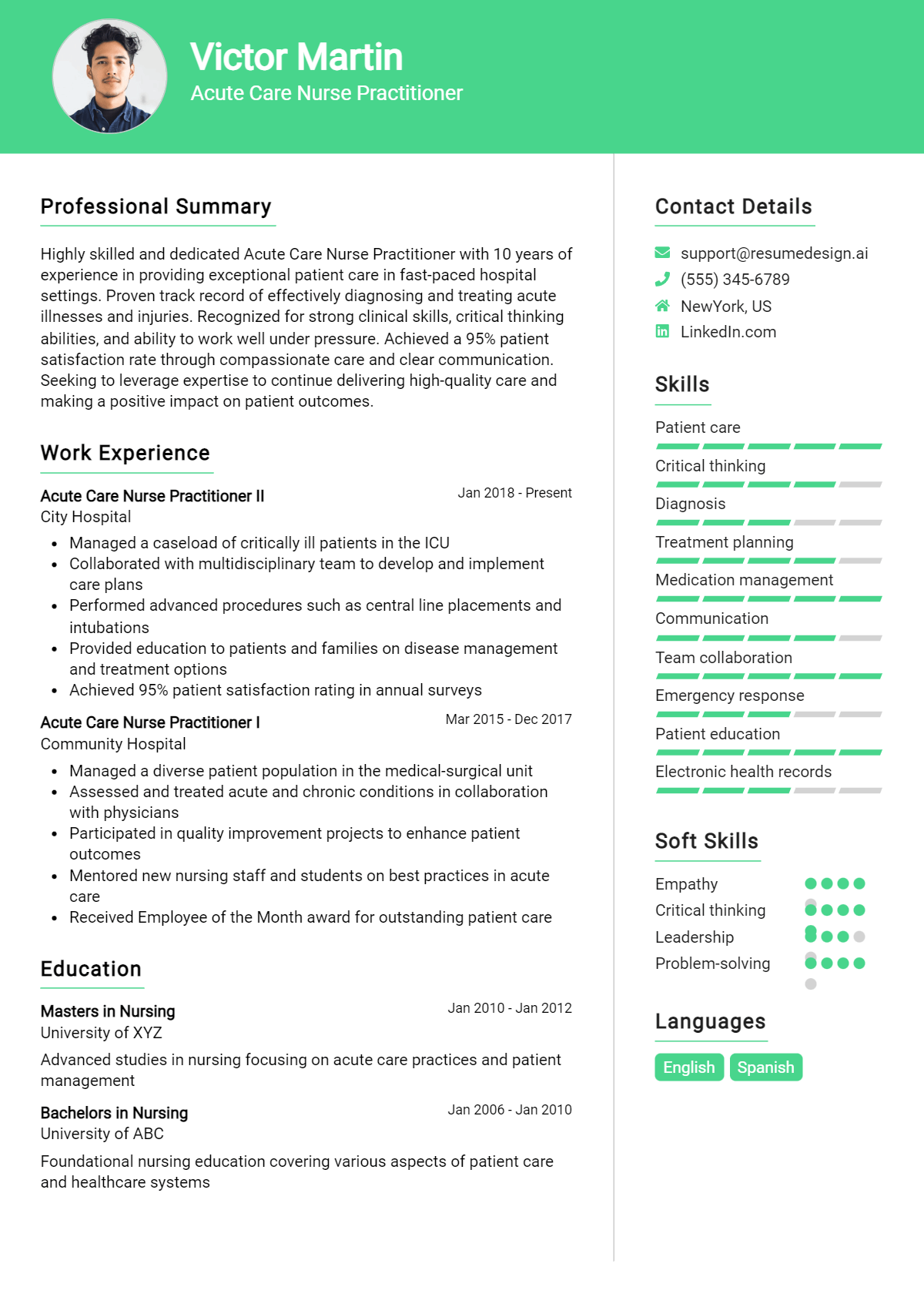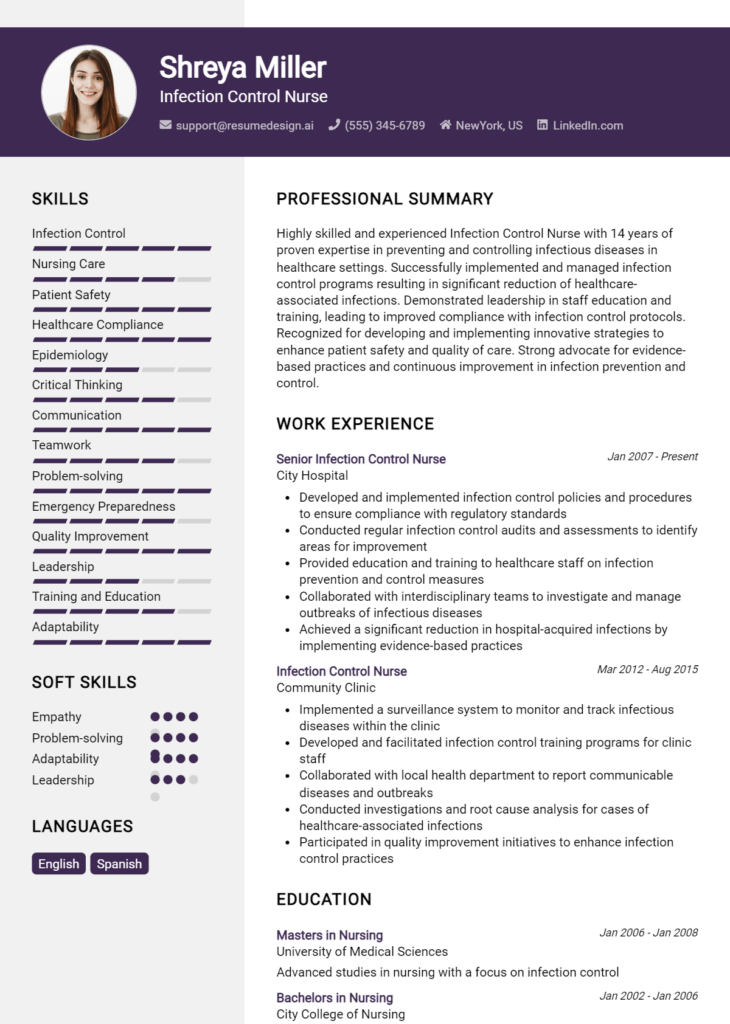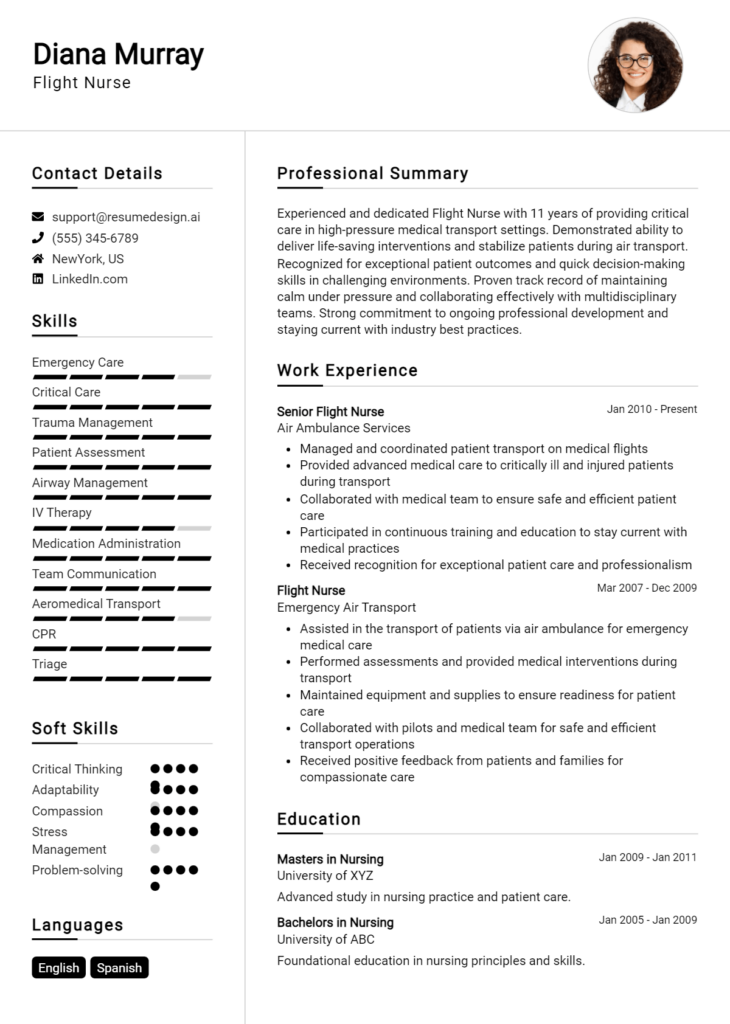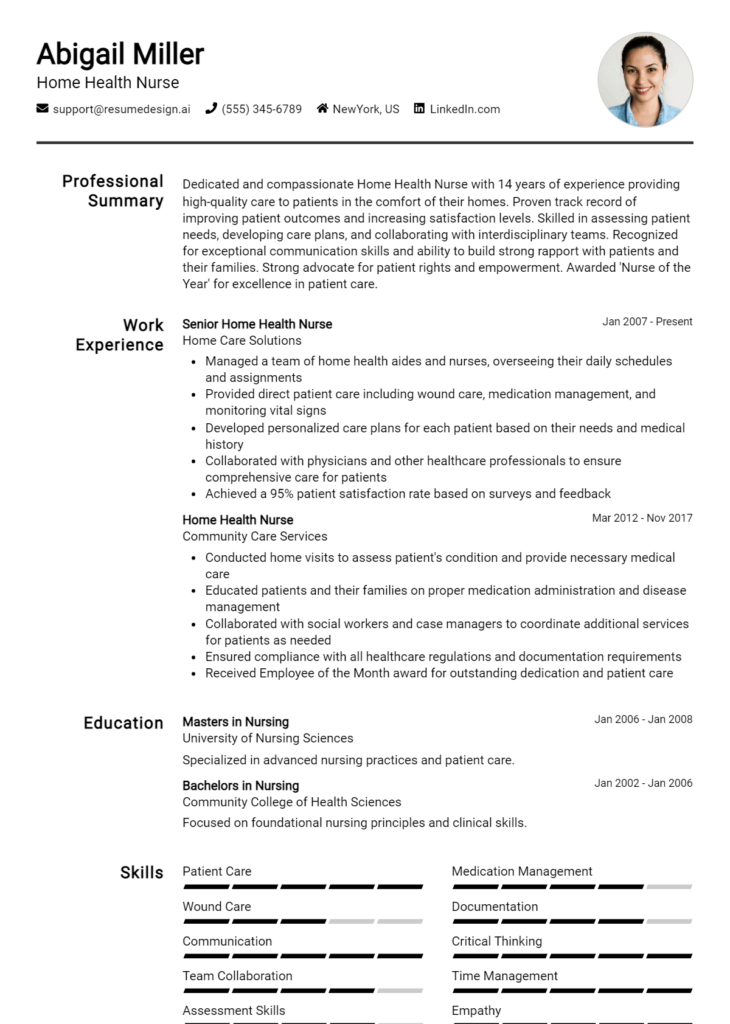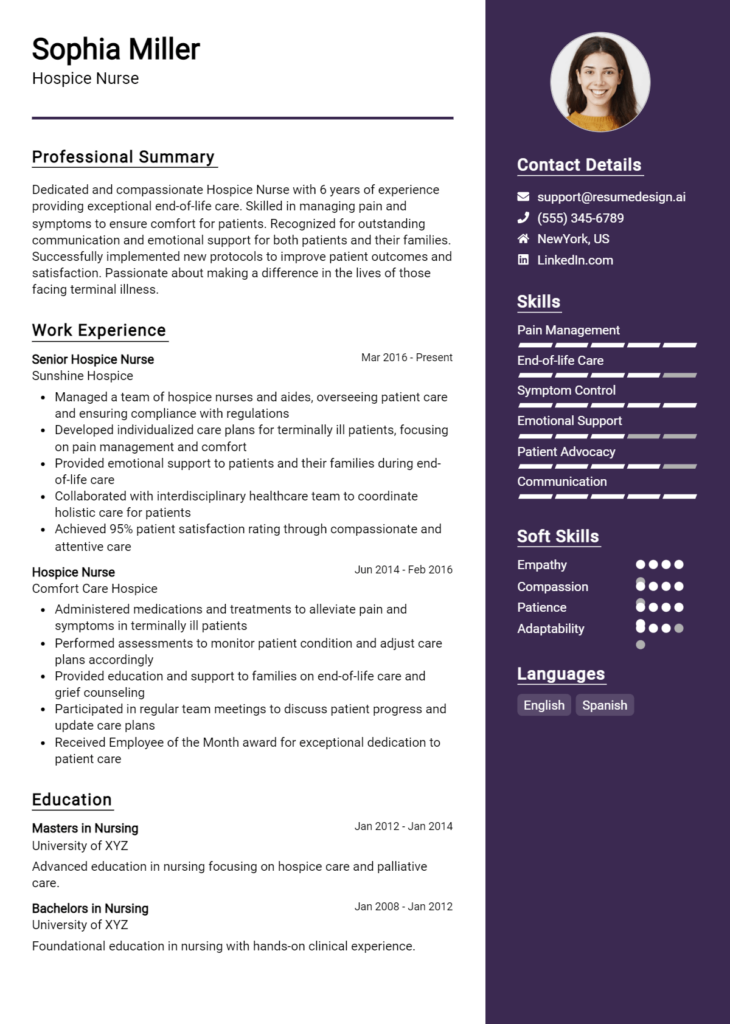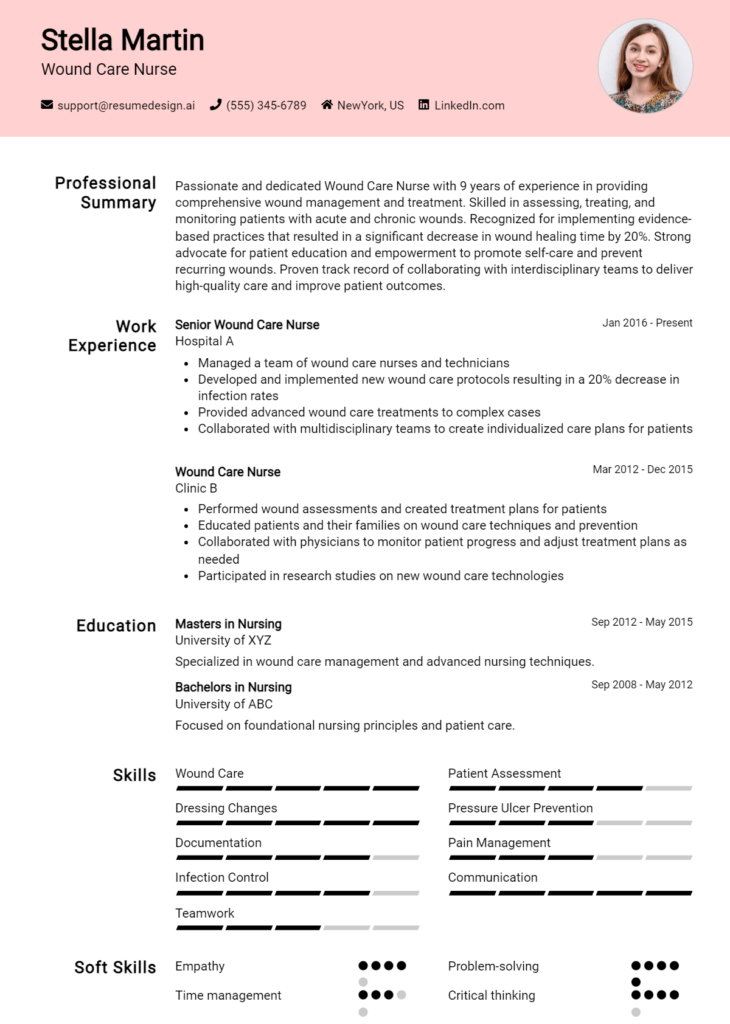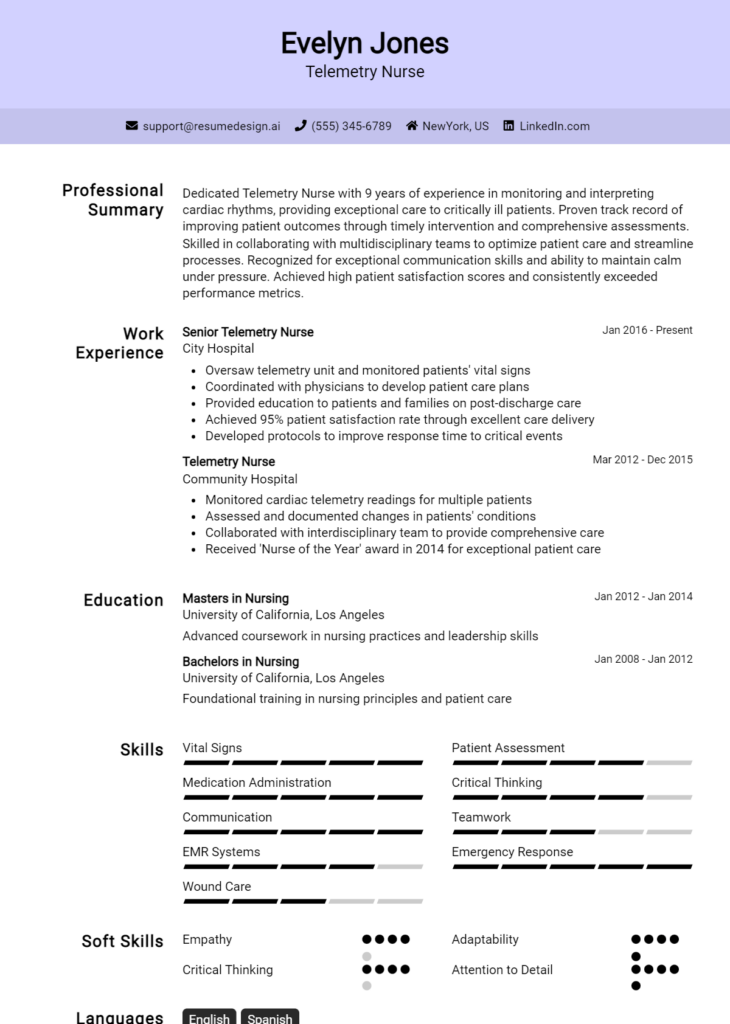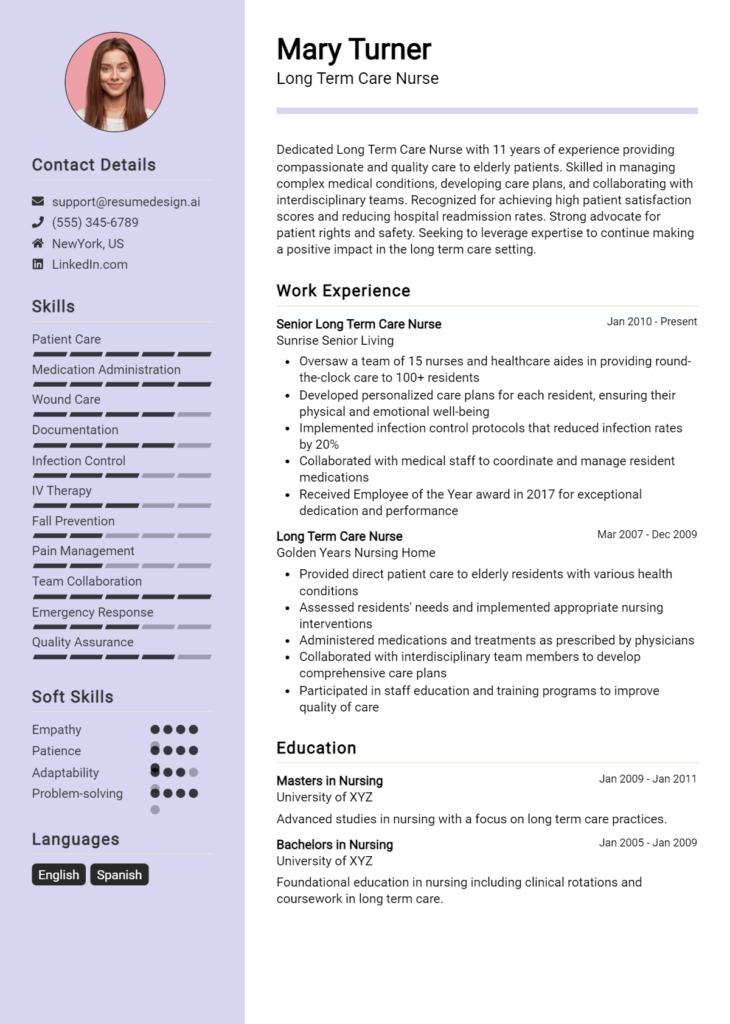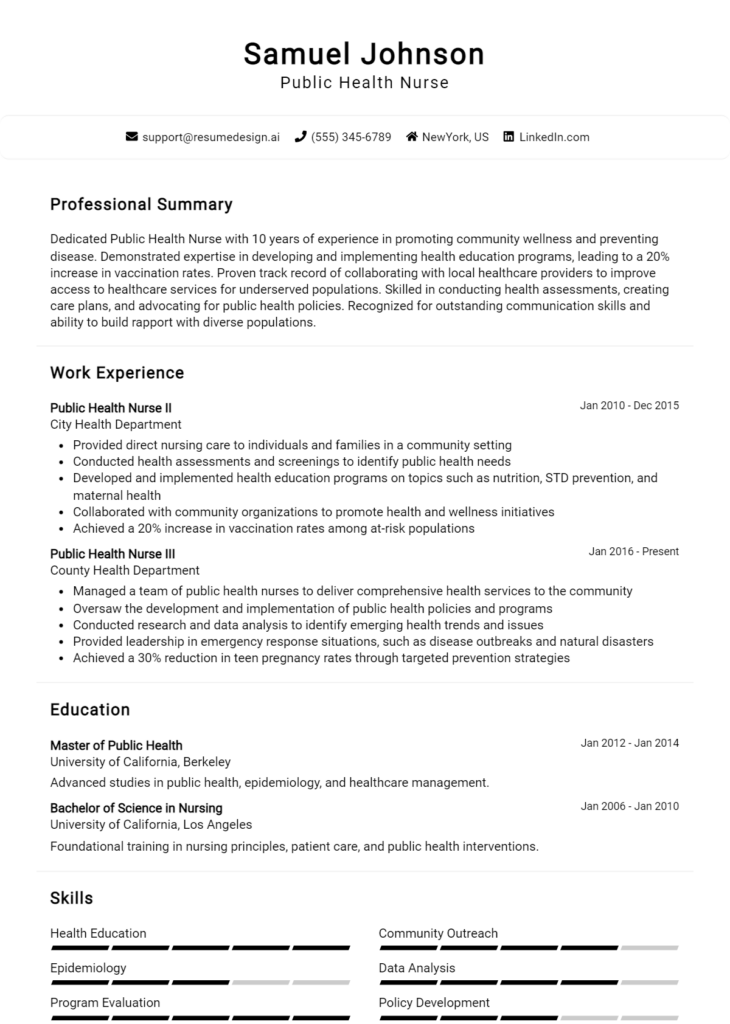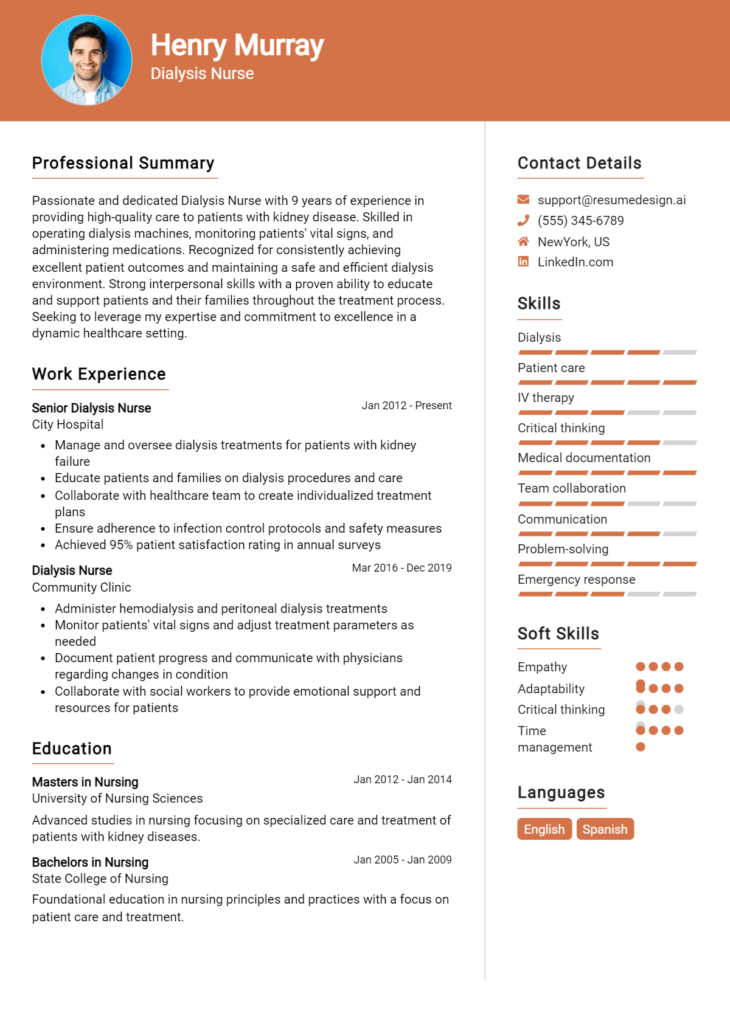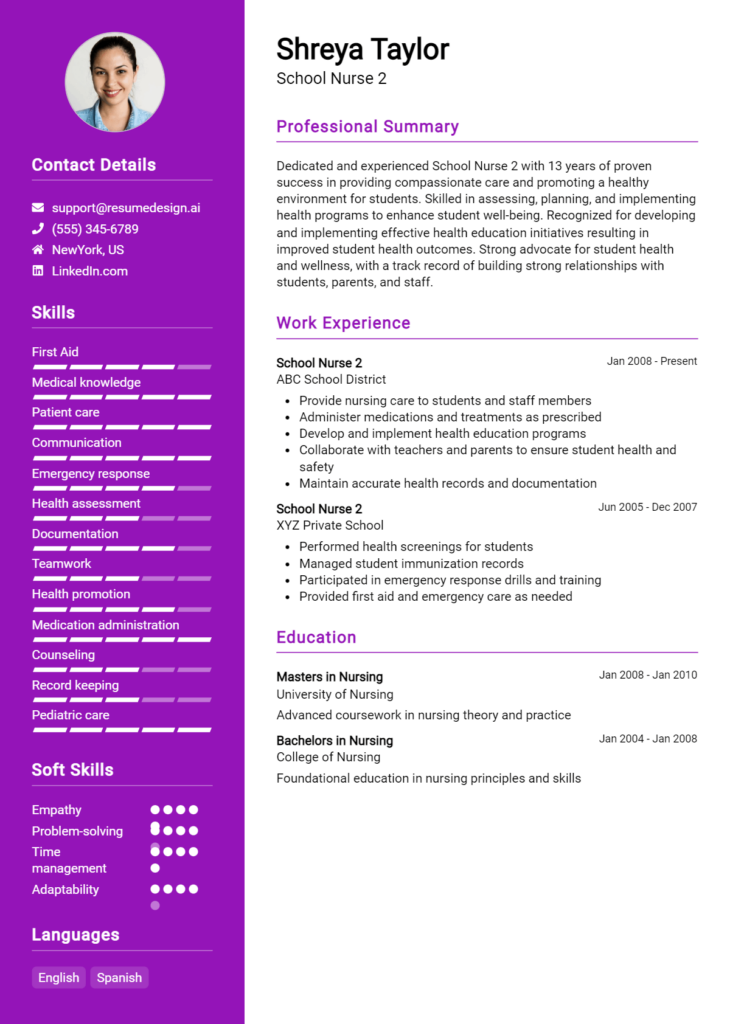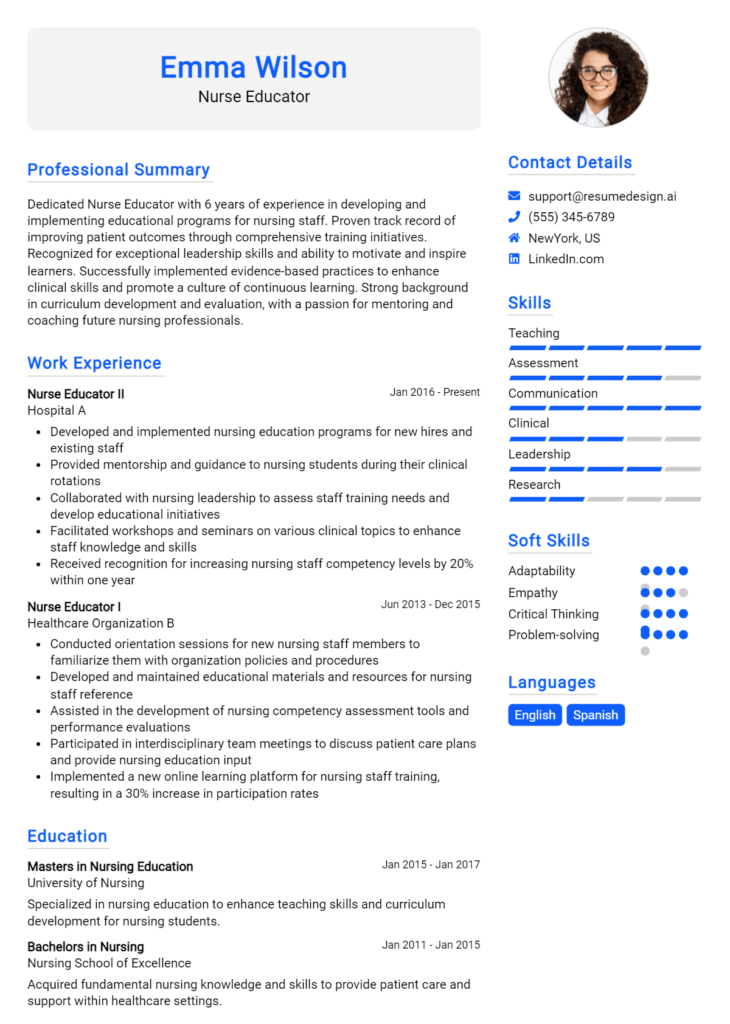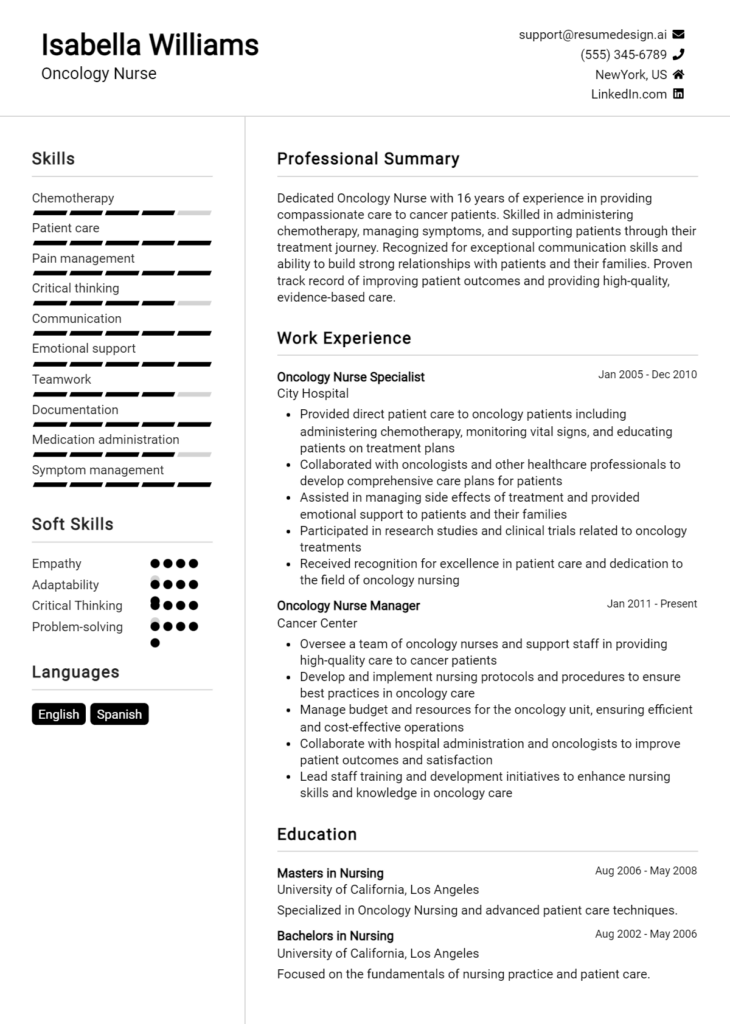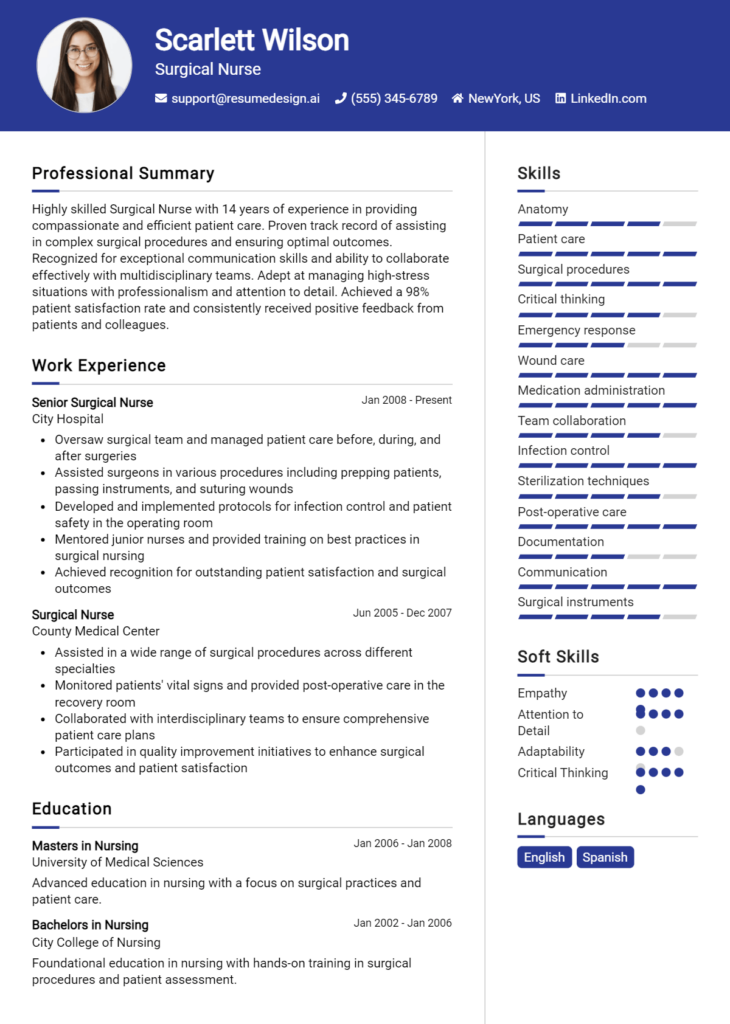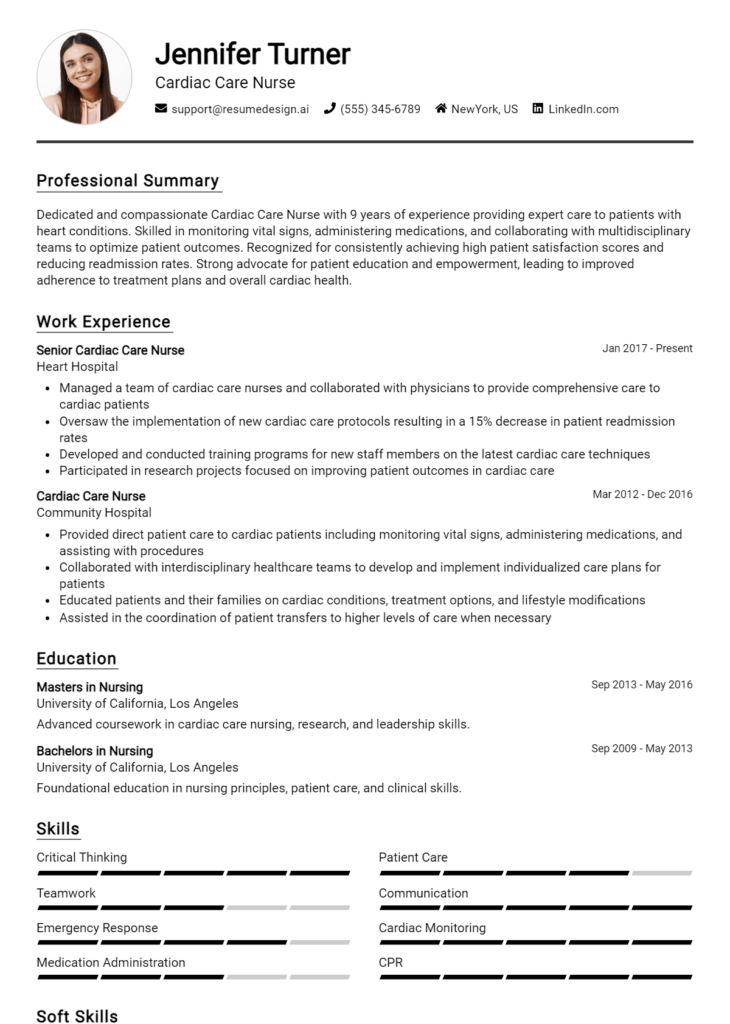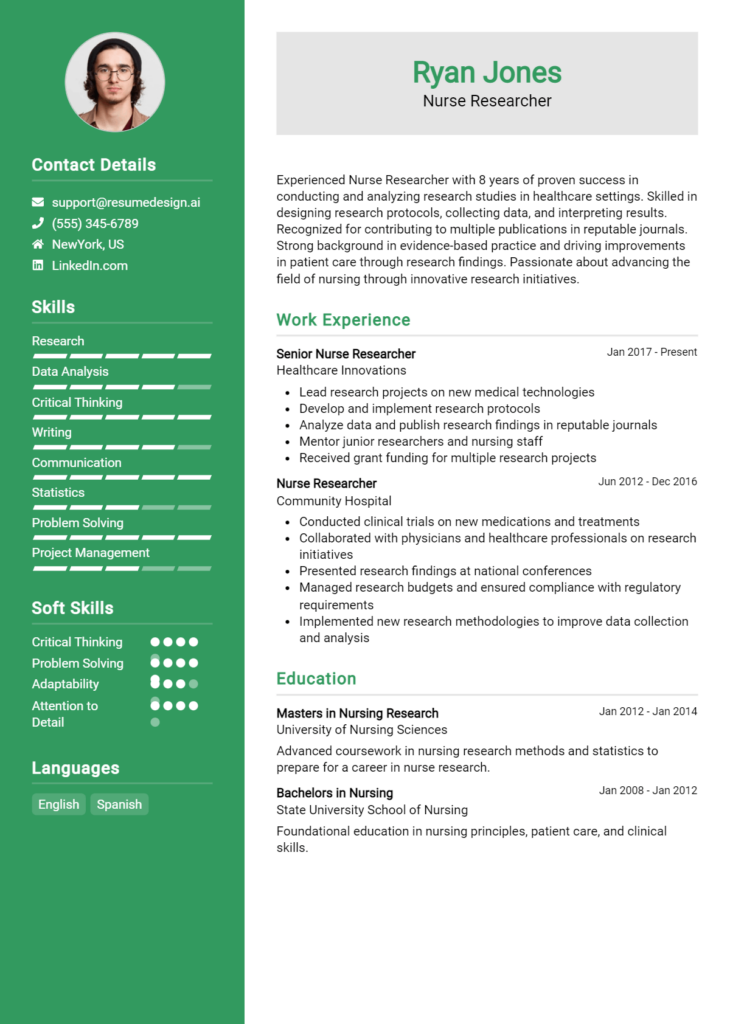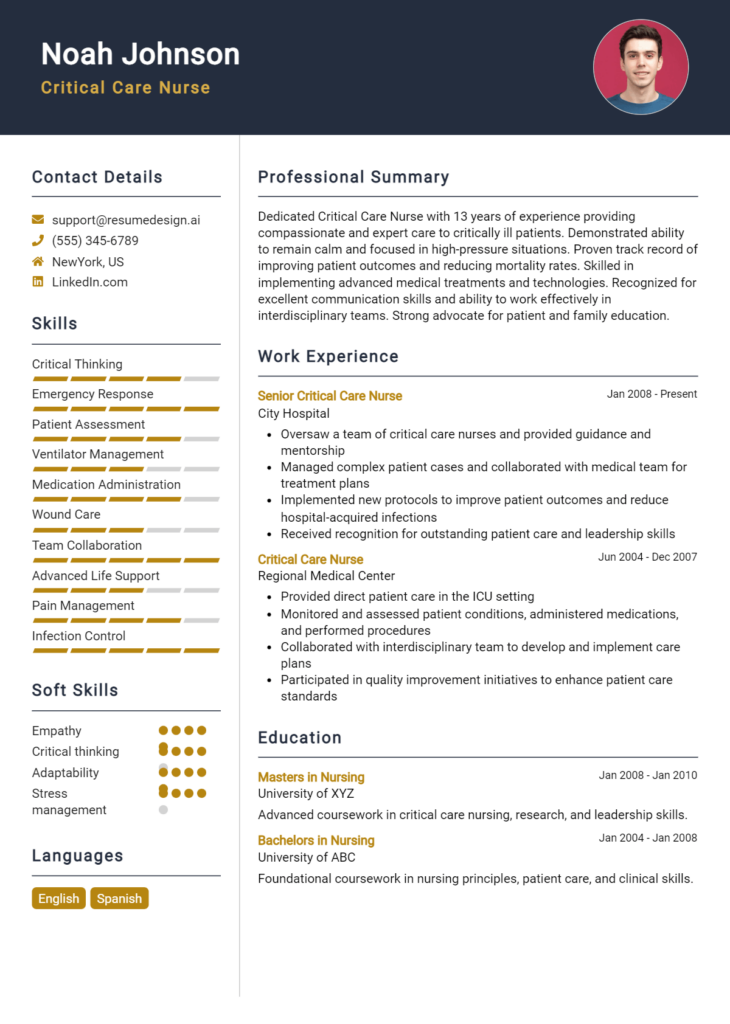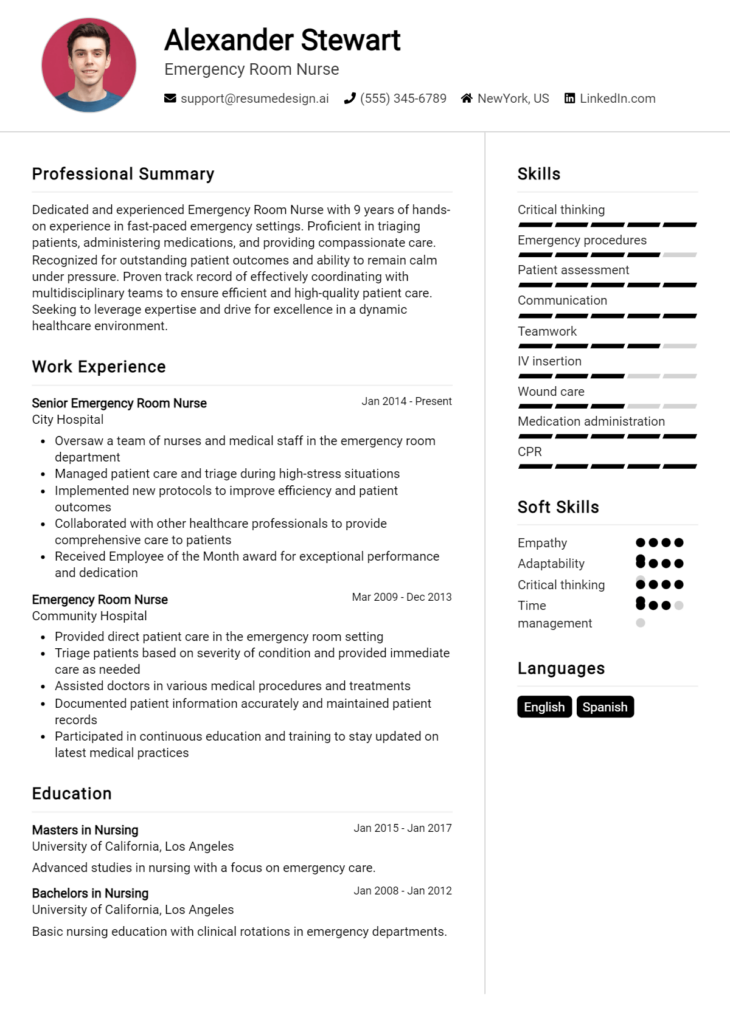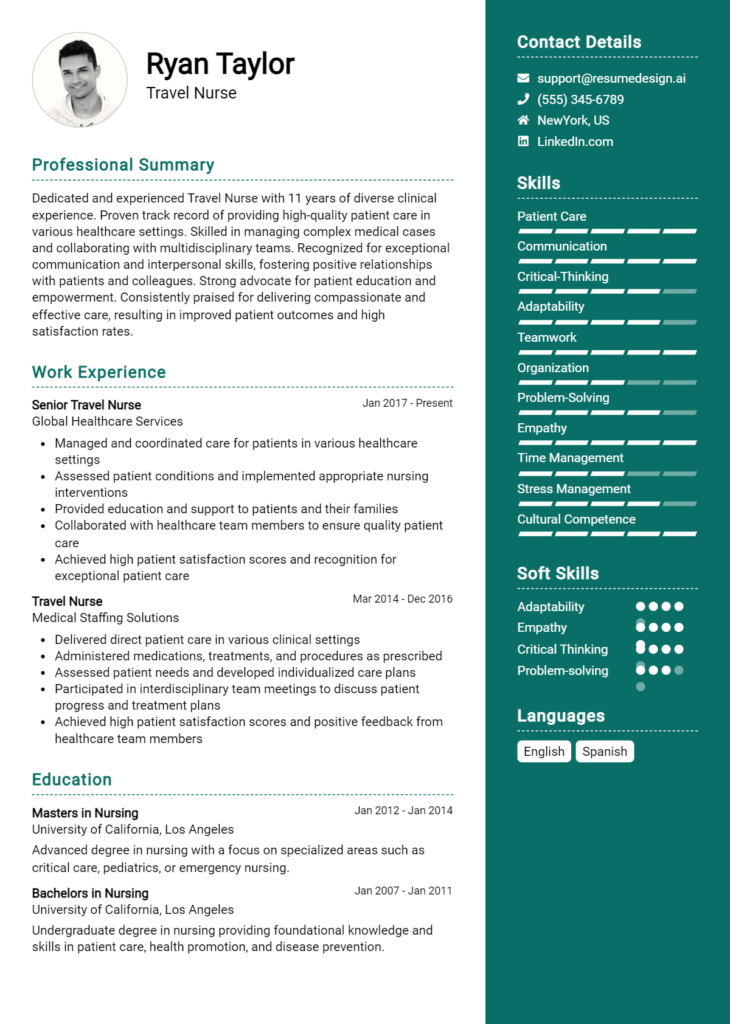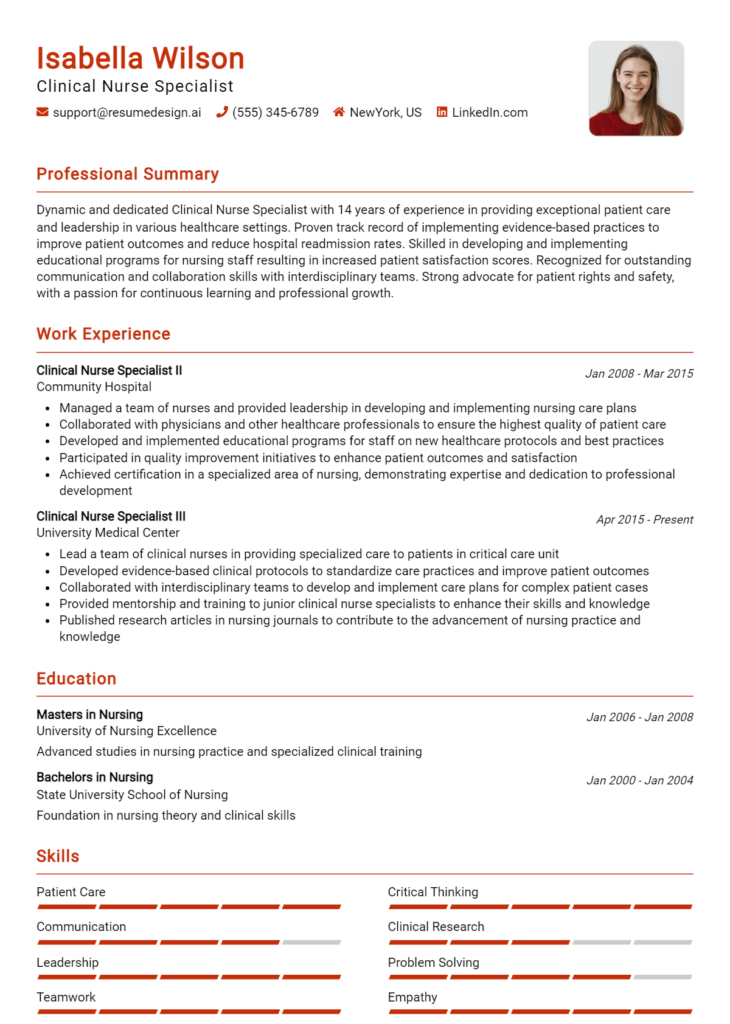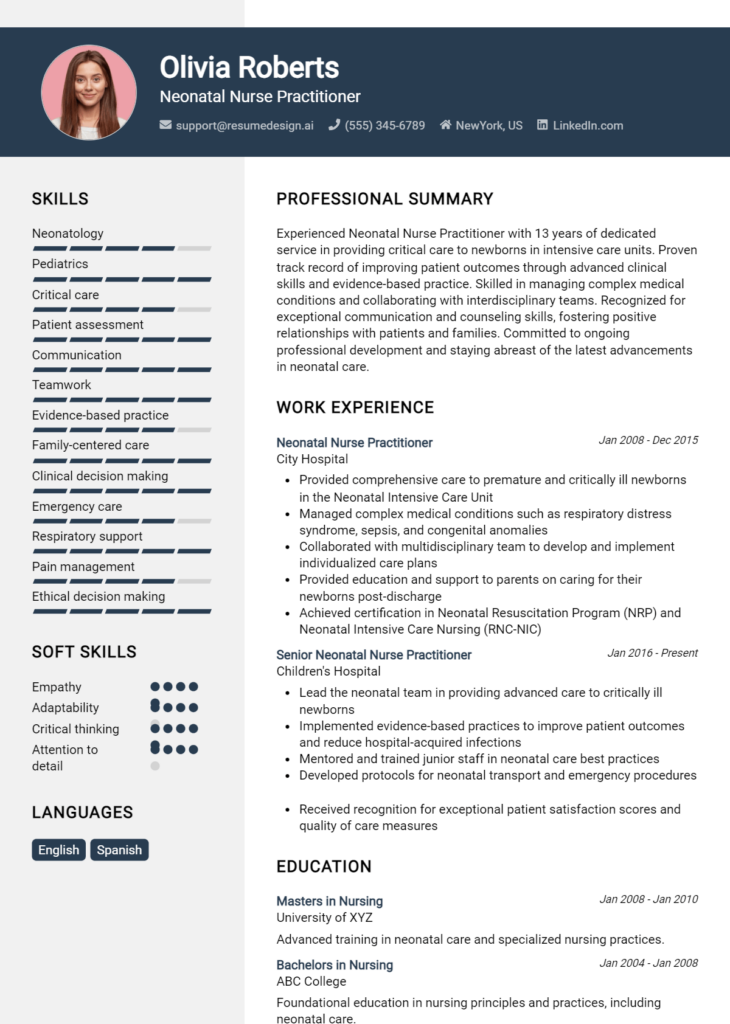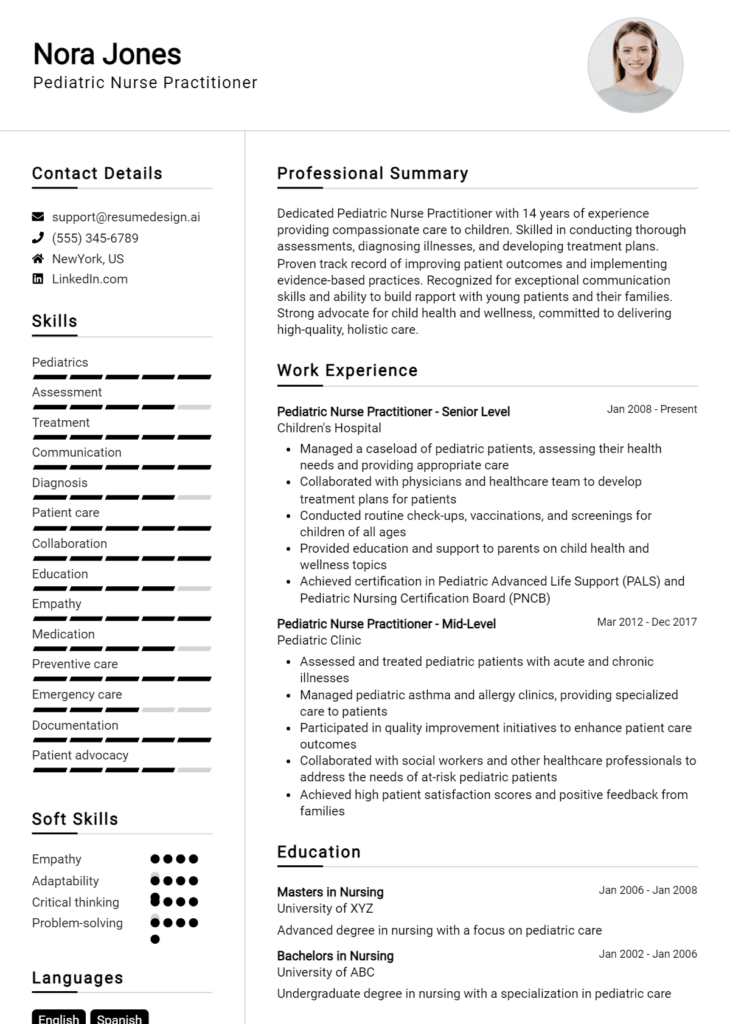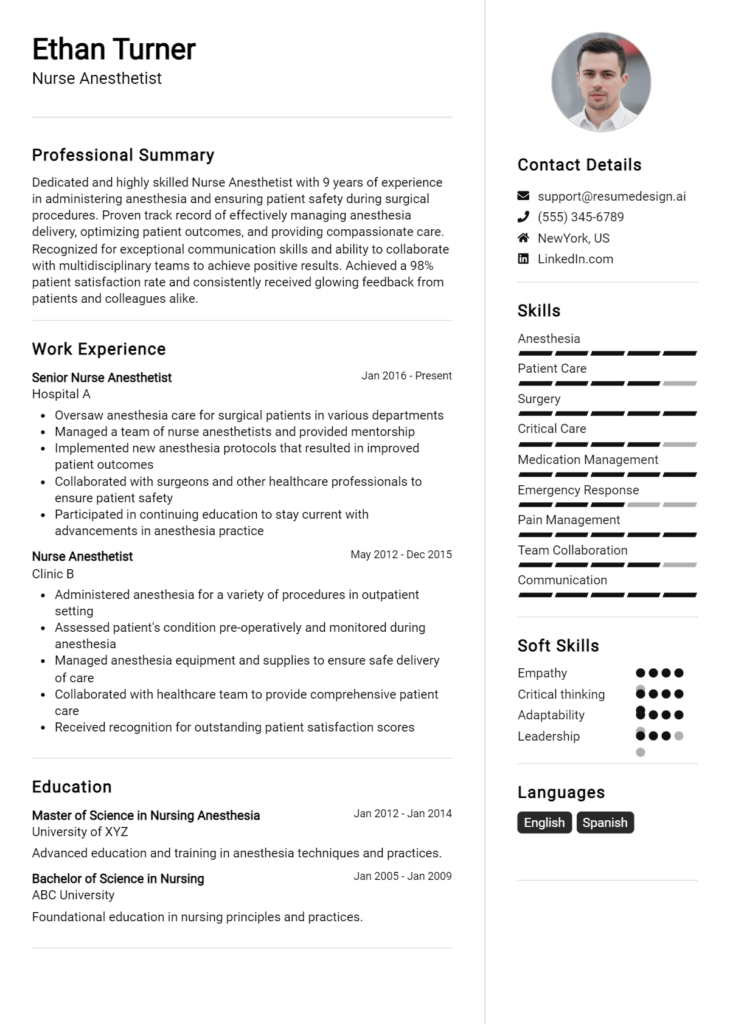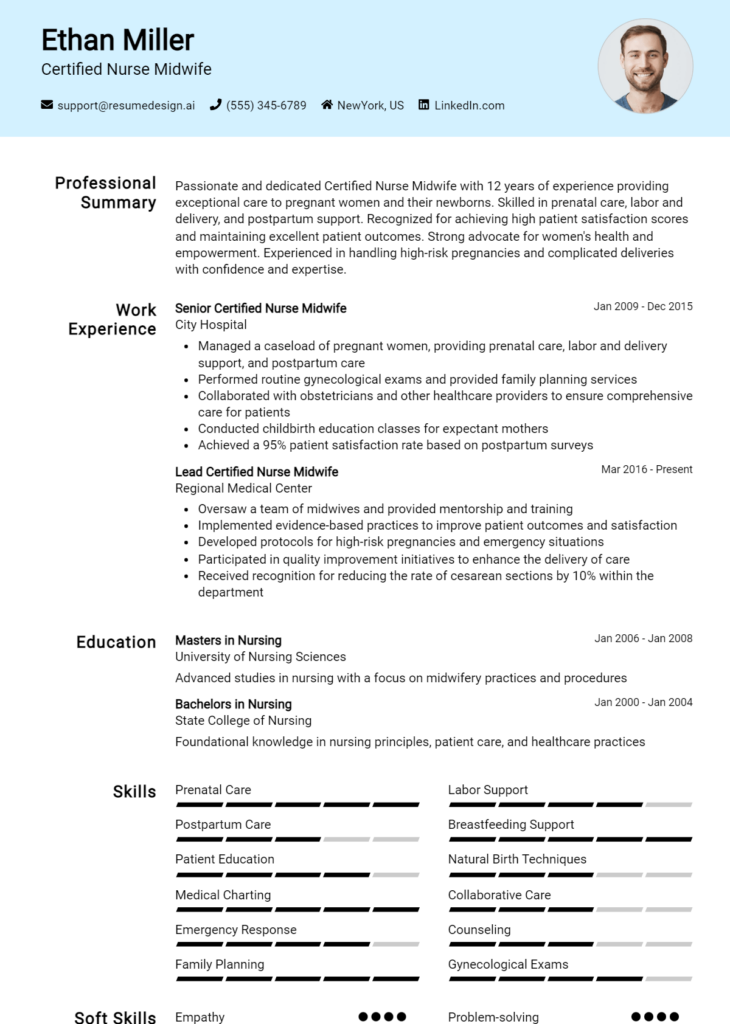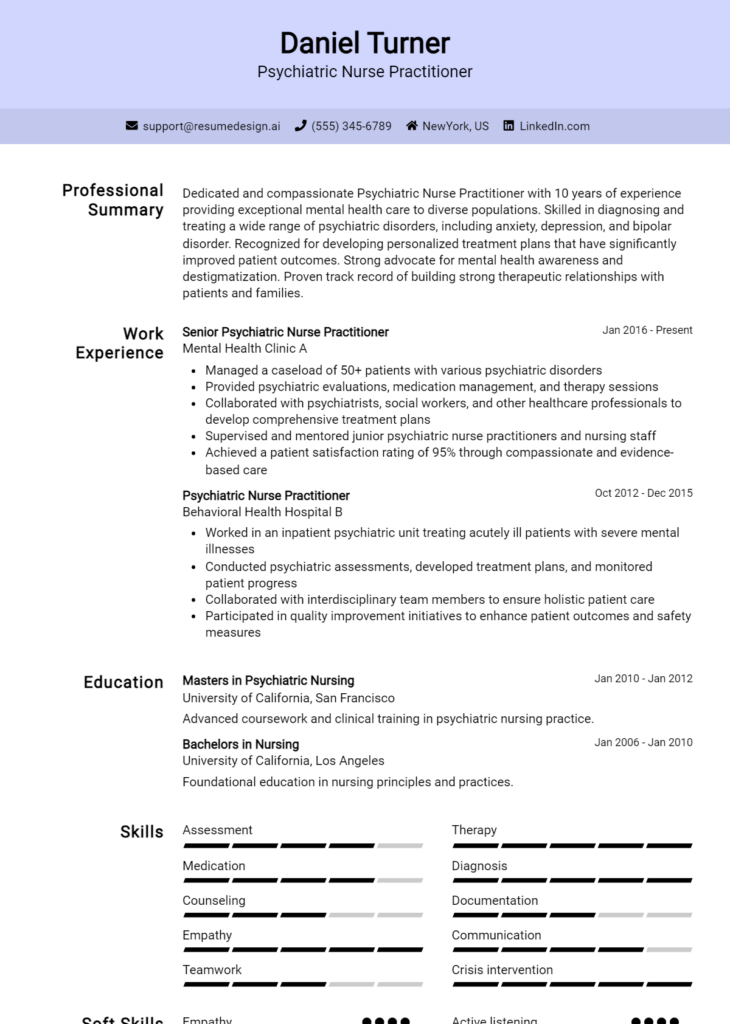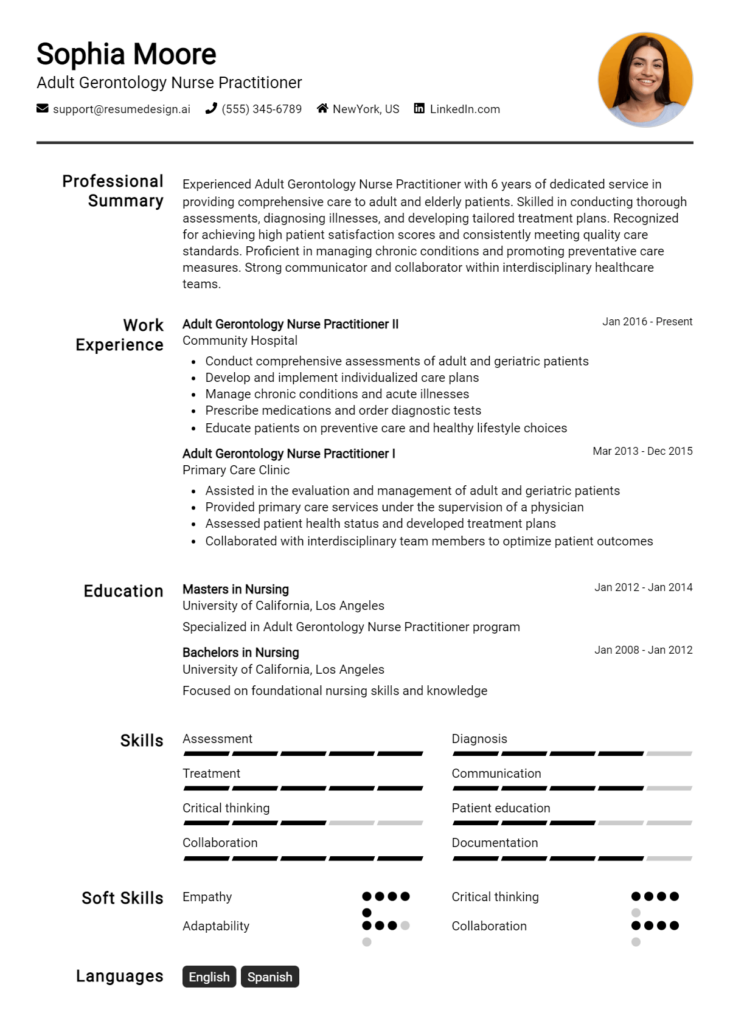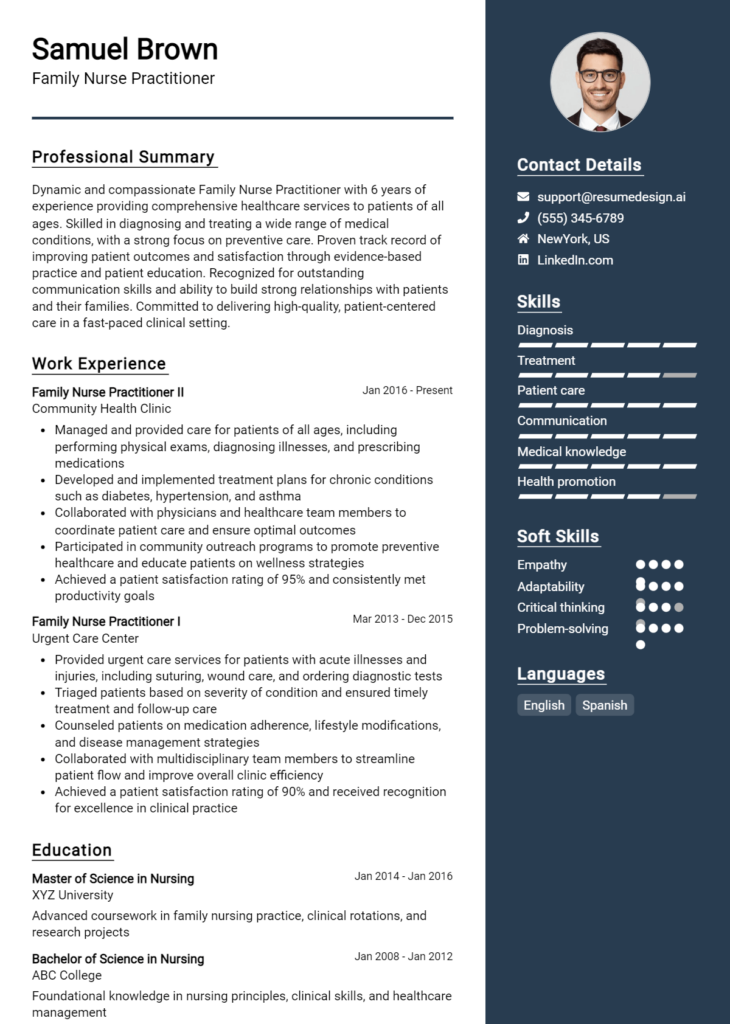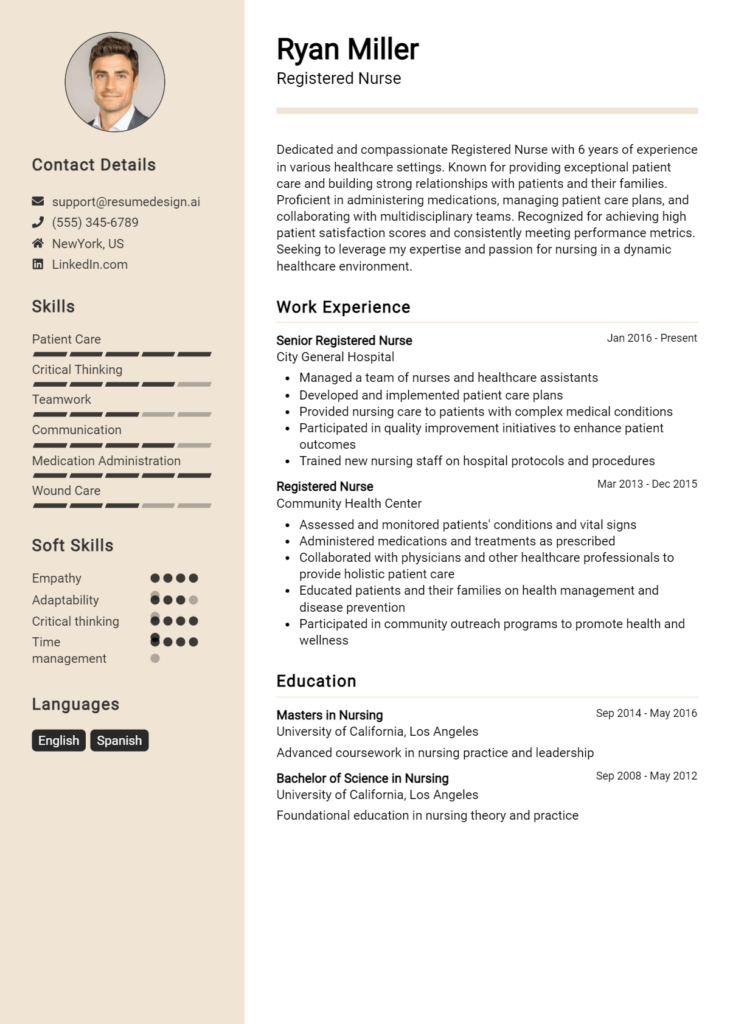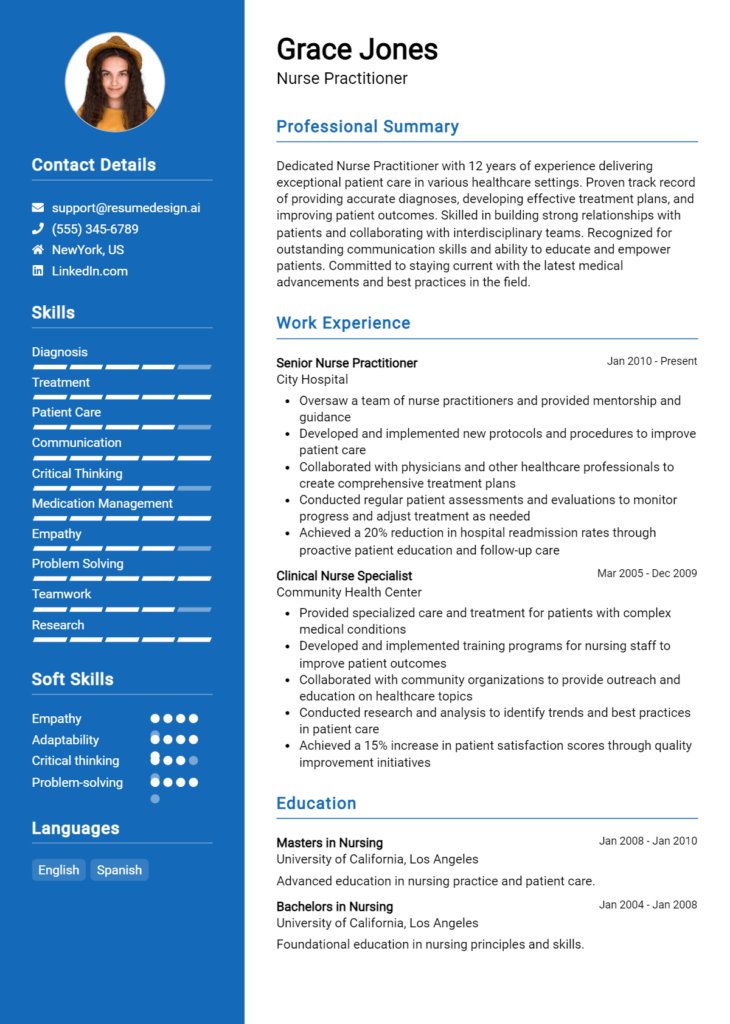Acute Care Nurse Practitioner Core Responsibilities
Acute Care Nurse Practitioners (ACNPs) are vital in delivering high-quality healthcare in fast-paced environments, bridging various departments such as emergency, critical care, and surgical units. They assess, diagnose, and manage complex patient conditions, requiring exceptional technical skills and operational expertise. Problem-solving abilities are essential for navigating urgent situations and ensuring patient safety. These competencies not only enhance patient outcomes but also align with organizational goals. A well-structured resume can effectively showcase these qualifications, highlighting the ACNP's pivotal role in healthcare delivery.
Common Responsibilities Listed on Acute Care Nurse Practitioner Resume
- Conduct comprehensive patient assessments and evaluations
- Develop and implement individualized care plans
- Perform diagnostic tests and interpret results
- Administer medications and manage intravenous therapies
- Collaborate with interdisciplinary teams for holistic patient care
- Educate patients and families on health management
- Monitor and document patient progress and outcomes
- Respond to medical emergencies and provide acute care interventions
- Participate in quality improvement initiatives
- Conduct research to improve patient care practices
- Provide mentorship to nursing staff and students
- Stay updated on medical advancements and best practices
High-Level Resume Tips for Acute Care Nurse Practitioner Professionals
In the competitive field of healthcare, a well-crafted resume is essential for Acute Care Nurse Practitioner (ACNP) professionals seeking to make a strong impression on potential employers. Your resume often serves as the first glimpse employers have of your qualifications, skills, and achievements. It is crucial that it not only reflects your clinical expertise but also highlights your unique contributions to patient care and team collaboration. This guide will provide practical and actionable resume tips specifically tailored for Acute Care Nurse Practitioner professionals, helping you stand out in this demanding and rewarding field.
Top Resume Tips for Acute Care Nurse Practitioner Professionals
- Tailor your resume for each job application by closely aligning your skills and experiences with the specific job description.
- Showcase your relevant clinical experience prominently, including the types of patients you’ve worked with and the settings in which you’ve practiced.
- Quantify your achievements using metrics, such as patient outcomes, improved care processes, or reduced hospital readmission rates.
- Highlight industry-specific skills, such as advanced assessment techniques, diagnostic capabilities, and familiarity with electronic health records (EHR) systems.
- Include certifications and continuing education that demonstrate your commitment to professional development and staying current in the field.
- Utilize action verbs to convey your accomplishments and responsibilities clearly, making your contributions stand out.
- Incorporate keywords from the job posting to pass through Applicant Tracking Systems (ATS) and catch the hiring manager's attention.
- Keep your resume concise and focused, ideally one to two pages, ensuring that every word adds value to your candidacy.
- Consider adding a summary statement at the top of your resume that encapsulates your experience and career goals in acute care nursing.
By implementing these expert tips, you can significantly increase your chances of landing a job in the Acute Care Nurse Practitioner field. A compelling resume that effectively showcases your qualifications and achievements will not only catch the eye of hiring managers but also set the stage for successful interviews and career advancements.
Why Resume Headlines & Titles are Important for Acute Care Nurse Practitioner
In the competitive field of healthcare, particularly for Acute Care Nurse Practitioners (ACNPs), resume headlines and titles play a crucial role in making a strong first impression. A well-crafted headline can instantly capture the attention of hiring managers, highlighting a candidate's key qualifications and setting the tone for the rest of the resume. By summarizing essential skills and experiences in a concise and relevant manner, a powerful headline not only engages the reader but also provides a clear indication of how the candidate aligns with the job requirements. This strategic approach ensures that the most important information is conveyed upfront, making it easier for potential employers to assess a candidate's fit for the role.
Best Practices for Crafting Resume Headlines for Acute Care Nurse Practitioner
- Keep it concise, ideally under 10 words.
- Use specific keywords related to acute care nursing.
- Highlight your most relevant certifications or specialties.
- Incorporate action verbs to convey proactivity.
- Tailor the headline to match the job description.
- Avoid buzzwords and clichés for a more authentic tone.
- Consider including years of experience for additional credibility.
- Ensure clarity and readability for quick comprehension.
Example Resume Headlines for Acute Care Nurse Practitioner
Strong Resume Headlines
Compassionate Acute Care Nurse Practitioner with 5 Years’ Experience in Emergency Medicine
Board-Certified Acute Care Nurse Practitioner Specializing in Critical Care Management
Results-Driven ACNP with Proven Expertise in Patient-Centered Care and Rapid Assessment
Weak Resume Headlines
Nurse Practitioner Looking for a Job
Experienced Nurse with Some Skills
Strong headlines are effective because they are specific and convey a clear message about the candidate's qualifications and strengths, making them memorable to the hiring manager. They provide immediate insight into the candidate's experience and areas of expertise, setting them apart from the competition. On the other hand, weak headlines tend to be vague and lack the necessary detail to engage the reader. They fail to demonstrate the candidate's unique value, which can result in missed opportunities for consideration in a competitive job market.
Writing an Exceptional Acute Care Nurse Practitioner Resume Summary
A well-crafted resume summary is essential for an Acute Care Nurse Practitioner (ACNP) as it serves as the first impression to hiring managers. This brief yet powerful section encapsulates the candidate's most relevant skills, experiences, and accomplishments, allowing them to stand out in a competitive job market. A strong summary not only highlights the candidate's qualifications but also aligns them with the specific needs of the position, ensuring it captures the attention of hiring managers quickly. To be effective, the summary should be concise, impactful, and customized for each job application, showcasing the candidate's unique value proposition.
Best Practices for Writing a Acute Care Nurse Practitioner Resume Summary
- Quantify achievements: Include specific numbers or percentages to demonstrate the impact of your work.
- Focus on key skills: Highlight the most relevant technical and interpersonal skills that align with the job description.
- Tailor the summary: Customize your summary for each position to reflect the specific requirements and priorities of the employer.
- Use action verbs: Start sentences with strong action verbs to convey a sense of proactivity and engagement.
- Keep it concise: Aim for 3-5 sentences that effectively summarize your qualifications without overwhelming the reader.
- Showcase relevant experience: Highlight specific experiences that relate directly to the acute care setting.
- Incorporate keywords: Use terminology from the job description to enhance compatibility with applicant tracking systems.
- Reflect your passion: Convey your enthusiasm for acute care nursing and commitment to patient care.
Example Acute Care Nurse Practitioner Resume Summaries
Strong Resume Summaries
Compassionate and detail-oriented Acute Care Nurse Practitioner with over 5 years of experience in critical care settings. Successfully managed a team of nurses to implement a new patient monitoring system, resulting in a 30% decrease in response time for critical interventions. Proficient in performing advanced diagnostics and treatment protocols, with a strong focus on patient-centered care.
Dedicated Acute Care Nurse Practitioner with 7 years of experience in emergency medicine, adept at quickly assessing patient conditions and implementing effective treatment plans. Achieved a 95% patient satisfaction rate in a high-volume trauma center, utilizing strong communication and clinical skills to enhance patient outcomes.
Results-driven Acute Care Nurse Practitioner with expertise in cardiology and a proven track record of improving patient outcomes. Led a quality improvement initiative that decreased hospital readmission rates by 20% through enhanced patient education and follow-up care strategies. Skilled in advanced cardiac life support and emergency response.
Weak Resume Summaries
Experienced nurse looking for a position in acute care. I have worked in various healthcare settings and am familiar with patient care.
Acute Care Nurse Practitioner with some experience in the field. I aim to provide good care to my patients and work well with others.
The strong resume summaries effectively highlight specific achievements, relevant skills, and quantifiable results that directly relate to the role of an Acute Care Nurse Practitioner. They demonstrate the candidate's impact in previous positions and their alignment with the job's requirements. Conversely, the weak summaries lack detail, specificity, and measurable outcomes, making them appear generic and unremarkable, thus failing to capture the attention of hiring managers.
Work Experience Section for Acute Care Nurse Practitioner Resume
The work experience section of an Acute Care Nurse Practitioner resume is critical as it effectively showcases the candidate's technical skills, leadership abilities, and commitment to delivering high-quality patient care. This section not only highlights the candidate's direct experience in acute care settings but also demonstrates their capability to manage teams, collaborate with multidisciplinary professionals, and implement best practices that enhance patient outcomes. By quantifying achievements and aligning their experiences with industry standards, candidates can provide compelling evidence of their qualifications and impact in the healthcare field.
Best Practices for Acute Care Nurse Practitioner Work Experience
- Highlight specific technical skills relevant to acute care, such as advanced assessment techniques and procedural competencies.
- Quantify achievements using metrics, such as improvements in patient outcomes or reductions in readmission rates.
- Use action verbs to convey leadership and initiative, such as "led," "managed," or "coordinated."
- Focus on collaborative efforts with healthcare teams to demonstrate ability to work in a multidisciplinary environment.
- Tailor experiences to align with job descriptions and industry standards for acute care nurse practitioners.
- Incorporate patient-centered care examples that show commitment to improving patient experiences.
- Include continuing education or certification achievements that reinforce ongoing professional development.
- Maintain clarity and conciseness to ensure that key accomplishments stand out to hiring managers.
Example Work Experiences for Acute Care Nurse Practitioner
Strong Experiences
- Led a team of 10 healthcare professionals in the management of a 20-bed critical care unit, achieving a 15% reduction in patient mortality rates over a 12-month period.
- Implemented a new triage protocol that decreased patient wait times by 30%, improving overall patient satisfaction scores by 25%.
- Collaborated with surgical teams to develop post-operative care plans, resulting in a 20% decrease in readmission rates within 30 days of discharge.
- Conducted over 150 advanced health assessments per month, identifying critical care needs and coordinating timely interventions to enhance patient outcomes.
Weak Experiences
- Worked in a hospital setting, providing care to patients.
- Assisted in various nursing tasks and responsibilities.
- Participated in team meetings and discussions.
- Helped with patient management and documentation.
The examples categorized as strong reflect a clear demonstration of impact, leadership, and measurable results. They illustrate how the candidate effectively utilized their technical skills and collaborative efforts to improve patient care and outcomes. Conversely, the weak experiences lack specificity and quantifiable achievements, making them less compelling to potential employers. They fail to convey the candidate's unique contributions or the significance of their role within the healthcare team.
Education and Certifications Section for Acute Care Nurse Practitioner Resume
The education and certifications section of an Acute Care Nurse Practitioner resume is crucial for showcasing the candidate's academic achievements and professional qualifications. This section serves as a testament to the individual's foundational knowledge, specialized training, and commitment to ongoing education in a demanding healthcare environment. By detailing relevant coursework, industry-recognized certifications, and any advanced training, the candidate can significantly enhance their credibility, demonstrating their alignment with the specific requirements of the Acute Care Nurse Practitioner role and their dedication to providing high-quality patient care.
Best Practices for Acute Care Nurse Practitioner Education and Certifications
- Include only relevant degrees and certifications that align with acute care nursing.
- List certifications in order of importance, starting with the most prestigious or relevant.
- Provide specific coursework that relates to acute care practices to demonstrate specialized knowledge.
- Highlight any continuing education courses or workshops to show commitment to lifelong learning.
- Include the dates of completion for degrees and certifications to indicate currency of knowledge.
- Consider adding honors or recognitions that emphasize academic excellence or clinical performance.
- Use clear and concise language to make the information easily readable and impactful.
- Be mindful of the format and ensure that the section is visually appealing and organized.
Example Education and Certifications for Acute Care Nurse Practitioner
Strong Examples
- Master of Science in Nursing (MSN), Acute Care Nurse Practitioner, University of XYZ, 2022
- Board Certified Acute Care Nurse Practitioner (ACNP-BC), American Nurses Credentialing Center, 2022
- Advanced Cardiovascular Life Support (ACLS) Certification, 2023
- Relevant Coursework: Advanced Pathophysiology, Pharmacology for Advanced Practice, and Critical Care Nursing
Weak Examples
- Bachelor of Arts in English Literature, University of ABC, 2010
- Certified Nursing Assistant (CNA), 2015
- Basic Life Support (BLS) Certification, 2010
- Coursework in Psychology and Sociology
The strong examples listed above are considered effective as they directly relate to the Acute Care Nurse Practitioner role, showcasing a relevant advanced degree, certifications, and specialized coursework that enhances the candidate's qualifications. In contrast, the weak examples highlight qualifications that are either outdated, irrelevant to the acute care setting, or do not demonstrate advanced skills necessary for the position, which could detract from the candidate's overall appeal to potential employers.
Top Skills & Keywords for Acute Care Nurse Practitioner Resume
An effective resume for an Acute Care Nurse Practitioner (ACNP) must showcase a robust combination of skills tailored to the demands of high-stakes healthcare environments. These skills not only highlight the candidate's clinical expertise but also their ability to communicate, collaborate, and respond to complex patient needs. Including a well-rounded selection of both hard and soft skills can significantly enhance an ACNP's resume, making it more appealing to potential employers and demonstrating their qualifications for the role. For guidance on how to effectively incorporate these skills into your resume, it's essential to understand the differences and applications of each skill type.
Top Hard & Soft Skills for Acute Care Nurse Practitioner
Soft Skills
- Effective communication
- Empathy and compassion
- Critical thinking
- Time management
- Team collaboration
- Adaptability
- Problem-solving
- Leadership
- Stress management
- Patient advocacy
Hard Skills
- Advanced cardiovascular life support (ACLS)
- Basic life support (BLS)
- Patient assessment and diagnosis
- Pharmacology knowledge
- Electronic health records (EHR) management
- Diagnostic imaging interpretation
- Advanced wound care
- Procedures and interventions (e.g., intubation, central line placement)
- Infection control protocols
- Research and evidence-based practice
By emphasizing these skills and effectively detailing your work experience, you can create a compelling resume that stands out in a competitive job market.
Stand Out with a Winning Acute Care Nurse Practitioner Cover Letter
Dear [Hiring Manager's Name],
I am writing to express my interest in the Acute Care Nurse Practitioner position at [Hospital/Clinic Name] as advertised on [where you found the job listing]. With a Master of Science in Nursing and over [X years] of clinical experience in acute care settings, I possess a robust skill set and a compassionate approach essential for delivering exceptional patient care in high-pressure environments. My clinical rotations in diverse healthcare facilities have equipped me with the knowledge and expertise to manage complex patient cases effectively, ensuring optimal outcomes and patient satisfaction.
In my previous role at [Previous Employer], I successfully collaborated with interdisciplinary teams to develop and implement tailored care plans that addressed the multifaceted needs of critically ill patients. I am adept at performing comprehensive assessments, interpreting diagnostic tests, and utilizing advanced practice protocols to provide high-quality care. My emphasis on evidence-based practices not only enhances patient safety but also fosters a culture of continuous improvement within the healthcare team. Moreover, I am committed to patient education and advocacy, ensuring that individuals and their families are well-informed and engaged in their care process.
I am particularly impressed by [specific attribute or recent initiative of the hospital/clinic], which aligns with my professional values and dedication to providing holistic care. I am eager to bring my clinical expertise, strong communication skills, and a patient-centered approach to the Acute Care Nurse Practitioner role at [Hospital/Clinic Name]. I look forward to the opportunity to contribute positively to your team and support the mission of delivering exemplary healthcare to our community.
Thank you for considering my application. I am excited about the possibility of discussing my qualifications further and exploring how I can contribute to the outstanding care at [Hospital/Clinic Name]. I look forward to your response.
Sincerely,
[Your Name]
[Your Contact Information]
[LinkedIn Profile or Professional Website, if applicable]
Common Mistakes to Avoid in a Acute Care Nurse Practitioner Resume
When crafting a resume as an Acute Care Nurse Practitioner (ACNP), it's essential to highlight your unique skills and experiences while avoiding common pitfalls that could hinder your chances of landing an interview. A well-structured and targeted resume can significantly impact your job search, but many candidates make mistakes that detract from their qualifications. Below are some common mistakes to avoid when creating your ACNP resume:
Generic Objective Statements: Using a one-size-fits-all objective can make your resume feel impersonal. Tailor your objective to reflect the specific role and institution you are applying to, showcasing your enthusiasm and fit for the position.
Ignoring Keywords: Many employers use applicant tracking systems (ATS) to filter resumes. Failing to include relevant keywords from the job description can result in your resume being overlooked. Be sure to incorporate industry-specific terms that align with the job.
Overlooking Clinical Skills: ACNPs must possess a diverse range of clinical skills. Neglecting to list specific competencies, such as advanced assessment techniques or familiarity with critical care protocols, can make your resume less impactful.
Inconsistent Formatting: A visually cluttered or inconsistent resume can be distracting. Ensure that your formatting is uniform, using the same font style and size throughout, and that headings are clear and easy to navigate.
Lengthy Descriptions: While it's important to provide details about your experience, overly long descriptions can dilute your message. Keep your bullet points concise and focused on key achievements and responsibilities.
Neglecting Continuing Education: As healthcare practices evolve, ongoing education is crucial for ACNPs. Failing to mention certifications, additional training, or workshops can give the impression that you are not committed to professional development.
Lack of Quantifiable Achievements: Simply listing duties can make your resume blend in with others. Instead, emphasize quantifiable achievements, such as improved patient outcomes or efficiencies you introduced, to stand out.
Ignoring Soft Skills: While technical skills are vital, soft skills like communication, teamwork, and leadership are equally important in acute care settings. Omitting these can leave a gap in showcasing your full range of abilities.
By avoiding these common mistakes, you can create a compelling resume that effectively showcases your qualifications and enhances your chances of securing an interview as an Acute Care Nurse Practitioner.
Conclusion
As an Acute Care Nurse Practitioner (ACNP), you play a pivotal role in providing high-quality healthcare in critical settings. This article has explored the essential responsibilities of an ACNP, including patient assessment, diagnosis, and the management of acute and chronic conditions. We’ve highlighted the importance of advanced clinical skills, effective communication, and collaboration within multidisciplinary teams. Moreover, the demand for ACNPs continues to grow, offering numerous opportunities for career advancement and specialization.
In light of these insights, it’s crucial to ensure that your resume reflects your qualifications, skills, and experiences effectively. A well-crafted resume can set you apart in a competitive job market. We encourage you to take the time to review and enhance your Acute Care Nurse Practitioner resume.
To assist you in this process, consider utilizing valuable resources such as resume templates, which provide a professional layout to showcase your credentials. Explore our resume builder that helps you create a customized resume tailored to the ACNP role. Additionally, check out our resume examples for inspiration and guidance on formatting and content. Don’t forget to pair your resume with a compelling application by utilizing our cover letter templates.
Take action today—revamp your resume and position yourself for success in your career as an Acute Care Nurse Practitioner!

